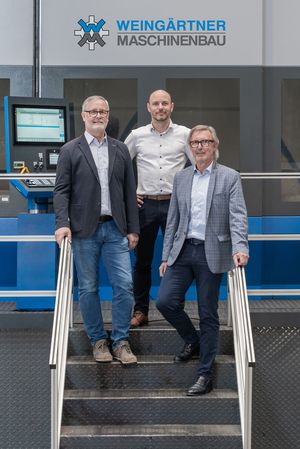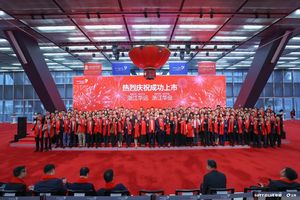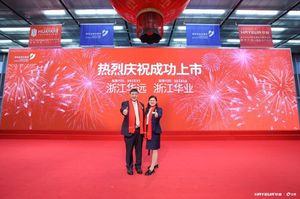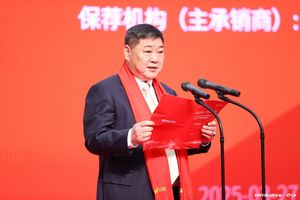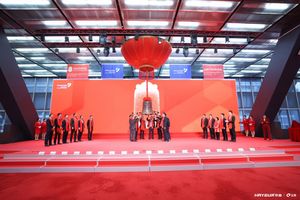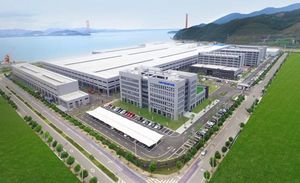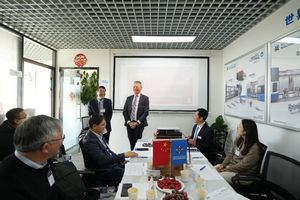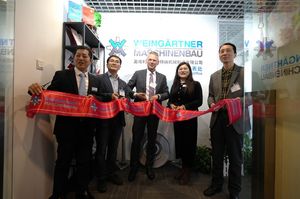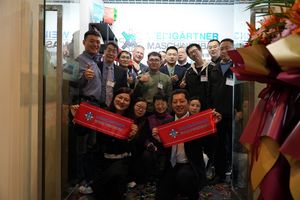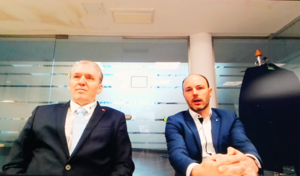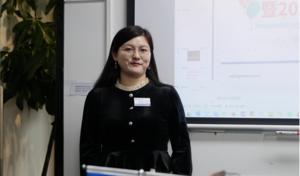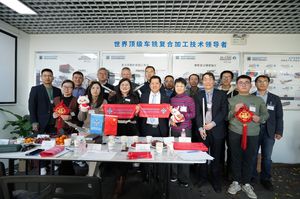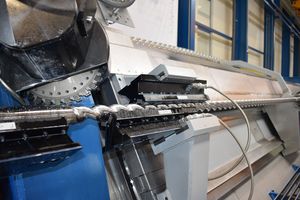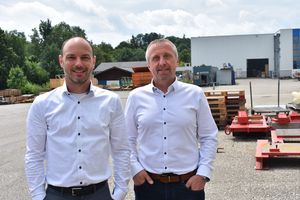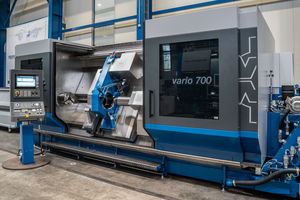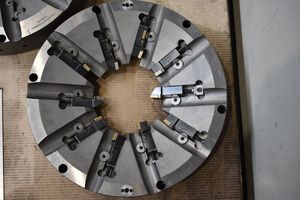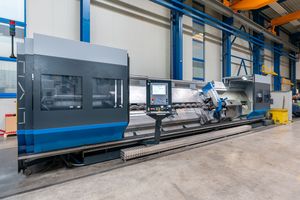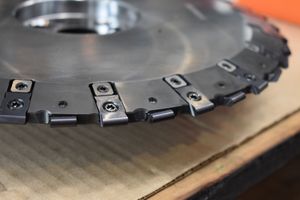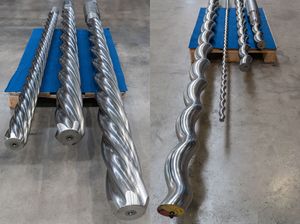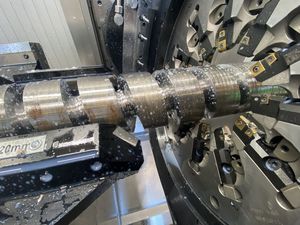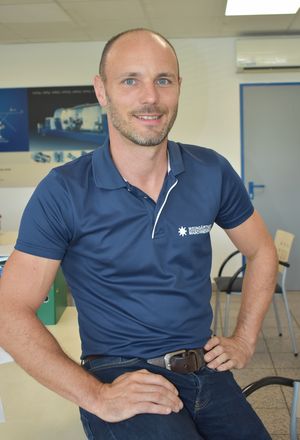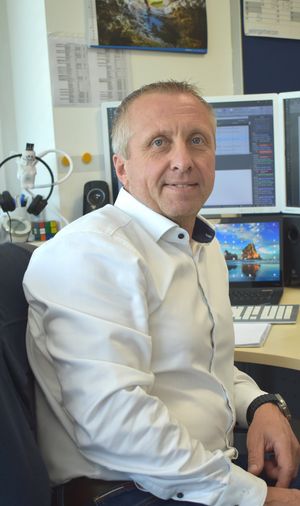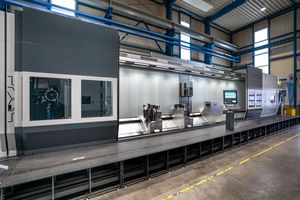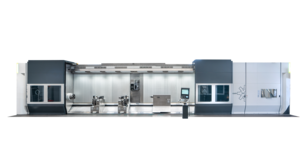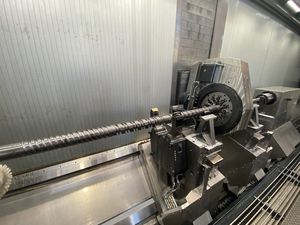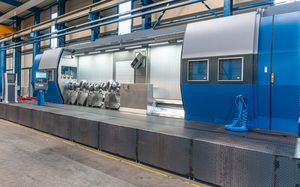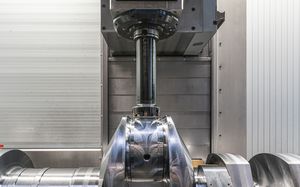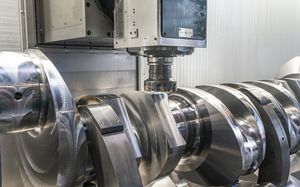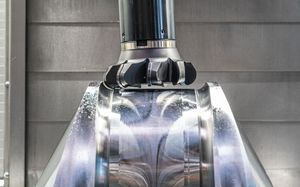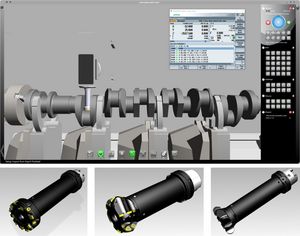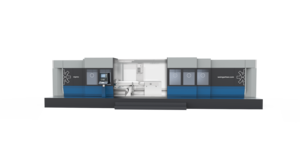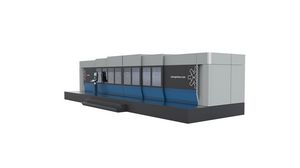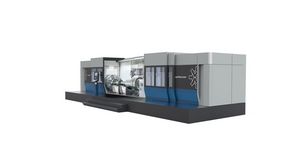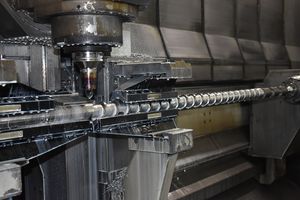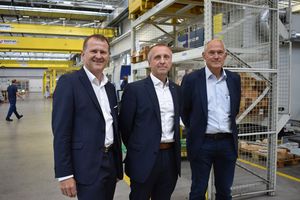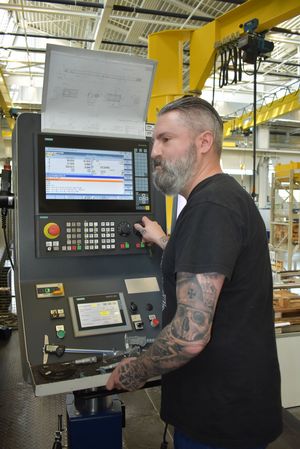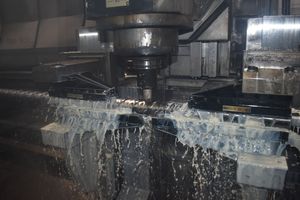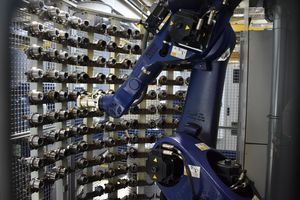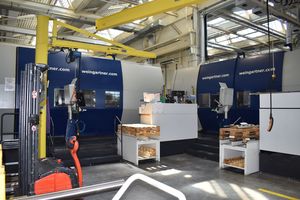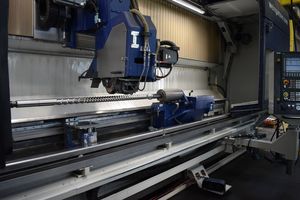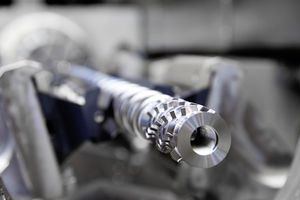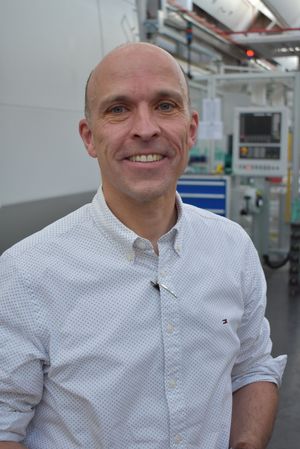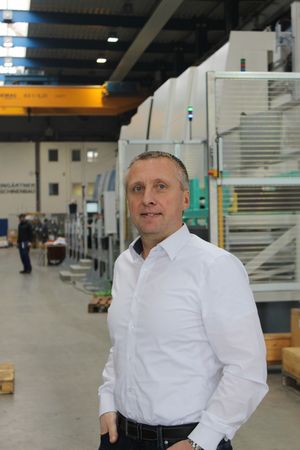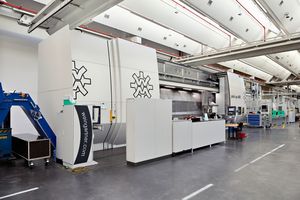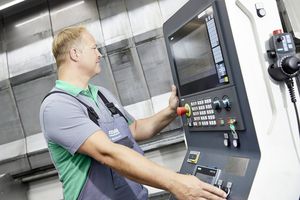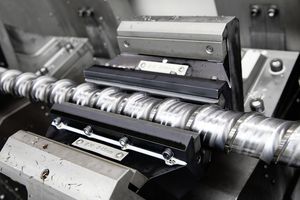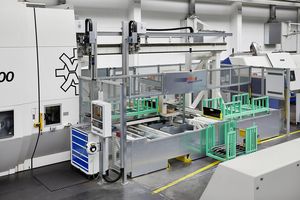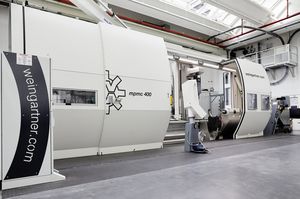What's new at Weingärtner?
2025 - Weingärtner Maschinenbau announces Leadership Transition
March 2025 – Weingärtner Maschinenbau GmbH is entering a new chapter. After decades of dedicated leadership, Ing. Friedrich Weingärtner retired at the end of February 2025. He has handed over the company’s management to his son, Dominik Weingärtner, who now leads Weingärtner Maschinenbau alongside his uncle, Andreas Weingärtner.
With a deep understanding of the company and its values, Dominik Weingärtner is committed to driving innovation and ensuring sustainable growth. His vision is to strengthen Weingärtner’s position as a leading technology provider, expanding its expertise in high-precision machining solutions while embracing digitalization and future-oriented manufacturing concepts.
This generational transition represents continuity, excellence, and forward-thinking leadership at Weingärtner.
2025 - Weingärtner Congratulates Zhejiang Huaye Plastic Machinery on Shenzhen Stock Exchange Listing
March 27, 2025 – Weingärtner Maschinenbau GmbH extends its sincere congratulations to its long-term partner, Zhejiang Huaye Plastic Machinery Co., Ltd. (Zhejiang Huaye), on its successful listing on the Shenzhen Stock Exchange Growth Enterprise Market (GEM) under the ticker symbol "301616.SZ."
As a strategic partner for over two decades, Weingärtner was honored to attend the listing ceremony, represented by Asia-Pacific Marketing Director Ms. Li Yulin. The event marked a significant milestone for Zhejiang Huaye, reinforcing its commitment to innovation and excellence in the plastic machinery industry.
A Milestone in the Capital Markets
The listing ceremony took place at the Shenzhen Stock Exchange, where Zhejiang Huaye’s Chairman, Mr. Xia Zengfu, reflected on the company's journey since its founding in 1994. He expressed gratitude to partners and reiterated Zhejiang Huaye’s dedication to advancing plastic molding technology and maintaining high-quality standards. The ringing of the opening bell signified the company’s official entry into the capital markets, celebrating past achievements and paving the way for future growth.
A Strong Partnership for the Future
Weingärtner and Zhejiang Huaye have collaborated closely since 2005, developing advanced manufacturing solutions for plastic machinery components. This partnership has been built on shared values of high-end manufacturing and technological excellence. Looking ahead, Weingärtner remains committed to further strengthening this alliance and driving innovation in the industry.
About Zhejiang Huaye Plastic Machinery Co., Ltd.
Founded in 1994 and headquartered in Zhoushan, China, Zhejiang Huaye specializes in the R&D, production, and sales of core components for plastic molding equipment, including screws, barrels, and tie rods. Serving industries such as automotive, electronics, and packaging, the company is recognized for its precision-engineered, high-performance products. With a strong focus on innovation, Zhejiang Huaye continues to push the boundaries of manufacturing excellence in the global plastic machinery sector.
2025 - New Beijing Office, opening a new chapter, embracing the future together
Weingärtner's Beijing Rep Office Housewarming Ceremony and 2025 Spring Tea Party
Weingärtner Maschinenbau GmbH successfully held its office housewarming ceremony and 2025 New Year tea party on January 10, 2025, at its new office in Tongzhou, Beijing. This event marked a milestone in the company's growth in China, fostering collaboration among partners, media, and industry experts.
Opening a New Chapter
The event took place at Weingärtner's new Beijing Rep office in Wanda Plaza, attracting officials from the Austrian Embassy’s Commercial Section, media professionals, and partners. Attendees toured the modern office space before Mr. Li Wenzeng (Andy Li), Sales Manager for Weingärtner China, introduced the company’s operations and vision for the future.
Mr. Franz Roessler, Commercial Counsellor at the Austrian Embassy in China, praised Weingärtner’s 60-year legacy of innovation and manufacturing excellence, emphasizing Austria’s industrial strengths. Mr. Chen Yongguang (Peter Chen), Executive Vice President of Machine China magazine, highlighted the company’s reputation for cutting-edge turning-milling technology and its growing influence in China.
A key moment of the event was the ribbon-cutting ceremony, where Mr. Roessler, Mr. Chen, and other distinguished guests celebrated the occasion with commemorative photos.
Strengthening International Cooperation
In a video conference with headquarters, CEO Dominik Weingärtner underscored the company’s commitment to innovation and global expansion. He announced increased production capacity, a new phase of construction at headquarters, and plans for Weingärtner’s 60th-anniversary celebration and factory open day in early 2026.
Robert Moser, Sales Director Asia, outlined the company’s market strategy, focusing on automation, precision machining, and sustainability. He reiterated Weingärtner’s dedication to delivering high-efficiency solutions for industries including petrochemicals, aerospace, and energy.
Mr. Li Wenzeng detailed the company's industry solutions, emphasizing Weingärtner’s expertise in customized machining. He showcased flagship machines, including one capable of processing 3000mm deep holes in a single setup, demonstrating the company’s technological leadership. Looking ahead, he reaffirmed Weingärtner’s commitment to customer-centric innovation and market expansion.
Marketing Director Asia, Ms. Li Yulin (Cherry Li), presented the company’s 2025 brand development plans, highlighting participation in major industry exhibitions such as CIMT, CIPPE, EMO Hannover, CMEE, and CAEE. These events will reinforce Weingärtner’s presence in key markets and showcase its advancements in turning-milling composite machining technology.
Industry Insights and Future Outlook
A guest discussion session explored the challenges and opportunities in the machine tool sector, with industry experts and media representatives analyzing market trends for 2025. The exchange of insights emphasized the growing importance of technological innovation in the field.
Looking Ahead
The housewarming ceremony and tea party underscored Weingärtner’s expansion in China and commitment to strengthening partnerships. As the company continues its journey of innovation, it looks forward to deeper collaboration with industry leaders and customers, shaping the future of machining technology together.
2024 - The name says it all
When food companies label new products with terms like "Plus" or "New," caution is warranted. Typically, these products contain less or inferior ingredients—naturally at a higher price. This is not the case with Austrian machine tool manufacturer Weingärtner. Their newly unveiled vario⁺ at the AMB trade fair offers users not only enhanced performance but also comes at a lower cost and requires less space.
The latest product "made in Kirchham" embodies Weingärtner's philosophy in a unique way. CEO Dominik Weingärtner explains, "The new vario⁺ is another example of our philosophy to provide not 'just' a machine, but a complete customer-oriented machining system." We don't sell standardized products, we sell technology. Our customers receive a customized package consisting of the machine, peripherals, software, and machining strategy. This principle applies to all products from Kirchham but is especially evident in the manufacturing of helical parts of all kinds—an area where Weingärtner is the absolute technology leader. As the production manager of a renowned injection molding machine manufacturer describes it, "...virtually unrivaled worldwide."
The machine concept of the "vario" is essentially the prototype of all Weingärtner developments. Sales Manager Klaus Geissler states, "The vario is our oldest machine model. The first ones were launched in the 1980s and were specifically designed for the machining of helical parts from the beginning. Today, this machine concept allows for the production of screws and helical parts using milling, peeling, and whirling technologies. Key applications include pump manufacturing for the oil and gas industry and rotor machining within the energy sector, including the production of ball screws."
Klaus Geissler continues, "The name 'vario' stems from the ability to cover different machining processes. With the new vario⁺, the changeover process can be completed within 15-20 minutes. This is significantly faster than previous models. We have deliberately continued with manual changeover but have greatly simplified it. Everything is realized with connection plates that automatically couple the entire electrical and media supply without additional effort."
The Weingärtner engineers have effectively squared the circle with the vario⁺: the machine is significantly more compact than its predecessors (let alone competitors' machines) and costs less while maintaining the same performance. For users, this translates to lower production costs and space-saving benefits. The "old" varios were much taller due to the gearbox for the milling spindle, which often caused transport issues. This problem has been resolved by incorporating a torque motor, maintaining at least the same performance. Klaus Geissler: "The vario⁺ can do everything as well as the previous models, is easier to transport and saves space and money."
These aren't just empty marketing statements, as a quick look at the technical data shows: parts with a workpiece weight of up to 5 tons (model 700 up to 4 tons) and a length of up to 12,000 mm can be machined. The milling units offer a power of up to 30 kW at 754 Nm, the peeling units up to 74 kW at a torque of 2,950 Nm, and the whirling unit boasts a power of up to 30 kW and a torque of 1,127 Nm. These figures clearly stand out from most competitors.
The entire machine bed has been redesigned from scratch, while the proven peeling and whirling units have been retained. The milling units faced the issue that the original drive concepts took up a lot of space. Using a torque motor provided an intelligent solution, eliminating the need for a gearbox. The significantly smaller milling drive reduced the machine's height considerably without performance loss. Klaus Geissler: "This performance is absolutely necessary. When using a 300mm disk milling cutter at relatively low speed, it is essential."
Two sizes of the vario⁺ are offered: 700 and 1,000. The previously offered 500 size in the original vario series is omitted, as the 700 model covers the production of smaller screws and worms without restriction. The possible machining lengths can be almost arbitrarily extended thanks to Weingärtner's typical welded construction. There are also several improvements in the machine peripherals. Klaus Geissler gives an example: "With the vario⁺, workpiece supports are now fully automatically programmable for diameter via servo-hydraulics."
All this unquestionably underscores Weingärtner's technical competence and is likely to make the vario⁺ a benchmark in this technology field. The Kirchham team has also adapted the machine's appearance to match other Weingärtner machines. The new design dispenses with the once-typical rounded doors and presents a modern look with angular doors. This change also provides customer benefits, as the new form offers better visibility due to fewer surfaces for coolant to adhere to. Furthermore, the customer can choose between two variants of the enclosure: one is the fully encapsulated version with automatic doors covering the entire working area, or the version where only the area around the processing unit itself is encapsulated and moves along with it. The second version offers additional savings potential in terms of machine procurement.
In terms of control systems, Weingärtner relies on its two trusted suppliers, Siemens and NUM, using the Siemens SINUMERIK ONE and the NUM FLEXIUM+ versions. Accompanying them is Weingärtner's trump card—the software package weinCAD®. This software allows for complete geometry coverage, automatic generation of NC blocks up to full NC programs, and 3D simulation of all machining processes. Dominik Weingärtner says, "To this day, there is no CAD/CAM system on the market that offers comparable performance."
In conclusion: "With the vario⁺, we are opening up new customer segments as we can offer the machine at a significantly lower price without any performance loss." Dominik Weingärtner can't resist a small jab at the competition: "Especially in the Asian market, there are always providers who try to gain market share with cheap offers. However, it shows that these machines are unable to deliver usable machining results in a short time. Basically, anyone who wants to deliver quality needs high-quality production tools."
2023 - A class of its own
The complete processing of complex large parts is undoubtedly the pinnacle of machining. And when it comes to the realm of high precision, there are hardly any alternatives to the modular turning/milling centers from the Austrian manufacturer Weingärtner. Strictly speaking, there are actually none.
In relevant publications, the term "Hidden Champion" is often used. This usually refers to companies whose level of public recognition is not particularly high but who set standards in their industry. In this sense, the Austrian machine tool manufacturer Weingärtner is a fitting synonym for the aforementioned Hidden Champion.
With around 200 employees, Weingärtner is certainly not one of the most globally renowned machine tool companies, but anyone who has visited the production halls of leading manufacturers of plastic machinery - alternatively, companies from the energy industry or oil and gas sector could also be mentioned here - will be impressed by the multitude of Weingärtner machines used there. The reasons for this are twofold: On the one hand, these machines are hard to miss due to their size, and on the other hand, their technological applications are always entrusted with the most demanding tasks.
For Managing Director Dominik Weingärtner, the latter is the logical consequence of the company's philosophy: "After all, we don't build standard machines; instead, we transform the specific customer requirements into a modern, complex machine concept. Our goal is always to optimize production for the customer and provide them with the best technical and economic solution. This logically includes not only the machine itself but also customized software solutions, specific technology, and the required support."
However, those who interpret these statements as heading towards custom machine construction are mistaken. Klaus Geissler, Sales Director of Weingärtner Maschinenbau GmbH, clarifies: "In doing so, we can largely draw on an extensive range of proven modules, which are continually expanded with specific innovations. Thanks to the mentioned modular approach, we have access to a multitude of solution approaches, which has led to the fact that we have never delivered two identical machines to different customers so far."
Dominik Weingärtner confirms: "Furthermore, our development engineers invest a lot of effort in continuously expanding the possibilities of complete machining through the meaningful integration of innovative processes."
Klaus Geissler explains this using the latest development as an example: "When it comes to the production of screws, there is no more effective method than whirling. However, hardly any company uses this technology for the production of complex screws anymore. The reasons for this are the long tool change times, but above all, there are hardly any skilled workers who are familiar with whirling tools and their setup. We have now succeeded in not only integrating the whirling technology into a turning/milling center but also ensuring tool changes in parallel with the main machining time within the machine." This eliminates all idle and waiting times for the customer, allowing for a significant reduction in lead time, especially in the production of screws for the plasticizing process in the plastics industry, estimated to be in the double-digit percentage range.
Although this innovation has been implemented and tested, it will unfortunately only be visible on the video screen at this year's EMO trade fair. Dominik Weingärtner states: "We have already delivered two machines with this innovation to a well-known German manufacturer of plastic machinery, but we cannot exhibit a machine with this feature at EMO because our production is currently engaged in other tasks. However, feedback from the mentioned plastics specialist confirms that we have hit the mark with this innovation."
By the way, it hasn't been long since Weingärtner revolutionized screw production with another process integration. Klaus Geissler explains: "We were the first ones to carry out the machining of cylinders and shafts on the one hand and screw production on the other hand on a single machine. The mpmc 850 used for this purpose has since proven to be a highly productive all-round system."
As key strengths in all of these innovations, three factors have proven themselves, in addition to the flexibility of the mpmc centers (Multi Product Machining Center): Firstly, the Weingärtner steady rest systems, which allow for the CNC-controlled support of very heavy and highly precise workpieces, enabling correction of the workpiece center even under full load. This allows the steady rest position to be automatically corrected during operation. Secondly, the patented prism steady rest system on the mpmc turning/milling centers provides vibration-free and precise support during screw machining. And thirdly—and perhaps the success of the entire company is based on this—the proprietary software package weinCAD®. In the field of screw manufacturing, Klaus Geissler is certain that there is no CAD/CAM system that performs comparable functions to the Kirchham-developed programming tool weinCAD®. "Our software covers all steps from process engineering and geometry design to automatically generated CNC programs and a 3D simulation of all machining processes." Although the software was developed decades ago, it has been continually updated to the latest standards due to our customers' requirements. This often amuses the Weingärtner software developers when they hear about the latest developments from the competition, as the presented features have usually been implemented in weinCAD® for years.
But of course, there will also be news at the Weingärtner booth at this year's EMO. Most prominently, and naturally so, is the new machine enclosure. The completely redesigned design offers more than meets the eye at first glance. Weingärtner has moved away from the previously typical convex machine enclosure to straight fronts. This not only creates a new appearance but also brings tangible advantages: The straight fronts not only reduce potential contamination from dripping coolant but also allow the installation of Visiport or Rotoclear windows in each door. At the same time, significantly larger windows provide a better view of the workspace. In addition, status lights are now integrated directly into the enclosure.
Also new is the arrangement of the tool magazines, which are now positioned on the front end of the machine on the right or left side, depending on preference, allowing for direct loading from the front. Innovations such as an integrated tool shuttle in the workspace, in conjunction with tool preparation using a 4-slot tool holder for shorter tool change times, represent further improvements.
The structural design of the machine bed has also changed. The newly designed inclined bed with a 45-degree angle creates significantly more favorable conditions for force introduction, resulting from machining and workpiece weight into the substructure. Another advantage of this geometric change is the optimized workspace for large steady rests and further improved ergonomics for the operator.
Sales Director Klaus Geissler says, "We were definitely the first to bring a functional complete machining machine for truly heavy workpieces to the market, guaranteeing a reliable and highly accurate machining of demanding workpieces. The mpmc series can be supplied for machining workpieces of up to 60 tons with a turning length of 15 meters and a workpiece diameter of 2 meters." With the newly designed machine bed, not only has the almost proverbial stability and rigidity of the mpmc centers been maintained but it has also been ensured that possible vibrations are effectively prevented.
Dominik Weingärtner: "In the industries we supply, the trend is towards increasingly larger and more complex assemblies and systems. Our task is to provide our customers with a machining system that can meet these resulting requirements. This includes not only comprehensive complete machining but also specific automation solutions. For example, all Weingärtner machines are equipped with a pick-up system as a standard feature, which means that we can fully automate the tool change process in three minutes." And, as Klaus Geissler concludes: "...the precision which is demanded and achieved would have been considered illusory just a few years ago."
2022 - Optimized Crankshaft Machining Through Engineering Expertise
When it comes to demanding machining applications in large-part manufacturing, Weingärtner is a highly sought-after partner. In addition to highly stable machining centers, the company excels in process technology, CAM software, and optimally designed tooling technology. In a challenging crankshaft project, Weingärtner collaborated with tooling expert Walter to achieve the required tolerances and surface qualities. Once again, Walter Austria demonstrated its high level of engineering expertise.
By Ing. Robert Fraunberger, x-technik
The Upper Austrian special machine manufacturer Weingärtner Maschinenbau GmbH has been a reliable and strong partner in the global machining industry for decades, having been founded in 1966. Initially focused on contract manufacturing, the company quickly evolved into a specialist in whirling machines for manufacturing screws for the plastics industry. For about 20 years, Weingärtner has also been offering highly productive horizontal turning-milling centers for the complete machining of large rotational parts to customers in the energy, plastics, aerospace, and heavy-duty machining industries. "Our mpmc complete machining centers are particularly in demand where customized solutions with high flexibility and precision are required," says DI Robert Moser, Sales Director Asia at Weingärtner.
Customized Complete Solutions
Weingärtner deliberately does not sell standard machines but instead offers complete solutions consisting of expert consulting, customized machining centers, software packages, application techniques, tailored training, and worldwide support. "Our customers always expect the best possible solution for their machining tasks," Moser adds.
Depending on the model, mpmc (multi-product machining center) machines can process components with a maximum turning and milling diameter of 2,000 mm and a maximum machining length of 15,000 mm.
Manufacturing Medium-Sized Crankshafts
Asia has always been an important market for Weingärtner, as large-part machining is widespread there. "China, among others, produces the largest crankshafts for marine diesel engines. This market is currently somewhat saturated, and the trend is shifting toward medium-sized shafts," Moser explains. Around two years ago, Weingärtner secured a new crankshaft project. "The customer is one of China's largest private crankshaft manufacturers and was a new client for us at the time," Moser adds.
The reason for winning the contract, according to the sales expert, was Weingärtner's technological advantage. "Chinese manufacturers increasingly aim to become technology leaders. In this project, the quality criteria were particularly stringent. We were able to impress with our comprehensive package, which included the mpmc 850 complete machining center, process technology, CAM software, and optimally designed tooling technology."
Choosing the Right Tooling Partner
The project involved machining ten different crankshaft types ranging from 3,500 to 5,500 mm in length. As part of the machine acceptance process, the customer required two fully machined components made from 42CrMo4 tempered steel. "These crankshafts needed to be sellable products—understandably so, given that each piece costs up to 60,000 euros," says Ing. Michael Wimmer, responsible for software and process development at Weingärtner. "Additionally, we had to conduct time studies for all variants, including optimal manufacturing strategies, tooling, and clamping systems, with corresponding simulations."
Choosing the right tooling partner with the necessary expertise was crucial in developing an optimal manufacturing strategy. "We contacted key tool manufacturers at the project's outset," Wimmer recalls. Walter Austria was among them and had already demonstrated its engineering expertise in previous projects. "The challenge in this application was the tool overhang length of up to 330 mm. Combined with the required tolerances for both diameter and surface finish, this was no easy task," explains Wolfgang Puchinger, sales engineer at Walter Austria, who oversaw the project.
Engineering Expertise as a Key Factor
For such demanding tasks, machining specialist Walter has dedicated engineering departments in Vienna and at its headquarters in Tübingen, Germany, that focus exclusively on developing optimal tooling solutions. Alongside these resources, Walter brings extensive knowledge in crankshaft machining and even has a dedicated manager specializing in this field. "We recognized Walter's high level of expertise right from our initial discussions. Their knowledge in crankshaft machining greatly benefited us, and their high-quality tooling solutions were exemplary," Wimmer states, explaining the decision to partner with Walter.
Walter Austria developed nine different custom tools optimized for each machining operation. "To meet quality requirements, we used vibration-damped special holders for all tools with a large length-to-diameter ratio. These were precisely tailored to the crankshaft specifications," Puchinger details. He further explains: "A major challenge in tool design was accurately reproducing the complex contours of the crankpin oil groove."
The custom tools for turning-milling operations incorporate indexable inserts arranged tangentially and laterally. Standard tools often cause surface waviness, which is why a special finishing tool with an axially adjustable brazed carbide plate was developed to replicate the groove contour and achieve the required surface quality.
Thanks to Walter's extensive portfolio of indexable inserts, all project requirements were successfully met. "For the end customer, it was crucial that Walter China could provide availability and service for series production," Puchinger notes. To ensure optimal performance and tool life, the latest generation of Tiger·tec® Gold-coated indexable inserts was used.
Digital Development
Due to COVID-19 restrictions in China, the entire project had to be developed digitally. "We program with Esprit and simulate with CHECKitB4—both supplied and supported by Pimpel," Wimmer mentions, acknowledging another important project partner. "Walter provided digital tool data, allowing us to immediately simulate, optimize, and eliminate potential collisions in CHECKitB4."
Walter's engineering experts consider this project a prime example of what can be achieved today through digitalization and networking. "The development and subsequent optimization process took about 13 weeks, during which we worked closely together to fully meet all customer requirements," concludes Michael Wimmer. The two completed crankshafts are already in use, and the entire system has been handed over to the customer.
2021 - The New mpmc, the Dawn of a new era
Dawn of a new era
For many years Weingärtner Maschinenbau GmbH, a global leader in machine tool technology, has been setting the standard for complete horizontal machining with the mpmc (multi product machining center), their modular, inclined-bed turning & milling machine. The mpmc is Weingärtner’s flagship product, and a team of highly qualified engineers continually strive to improve and develop it further.
It is important to stay at the cutting edge of technology, which is why it is equipped with a comprehensive, regularly updated software package and has a considerable amount of customization options that can be tailored to specific and individual requirements.
Precision, efficiency and versatility are just some of the features that this machine concept has to offer - a concept that increases the quality of your workpieces while reducing production time.
The ergonomic design of the machine guarantees comfortable and safe operation. The wide base, the excellent guide ratio and the configuration of the guideways ensure stability and prevent vibration during operation, even under extreme cutting conditions.
Every major machine component has been designed with stringent safety features in mind. These aspects combined with the solid structure of the machine are crucial to meet the mpmc’s high performance expectations. The aim is to produce at higher performance rates and with greater accuracy.
Examples of workpieces that this impressive machine can complete with just a few simple setups are:
// injection molding screws
// extruder screws
// turbo-generator shafts
// gas- and steam turbine shafts
// crankshafts
The mpmc is supported globally, from technical consulting right through to the after-sales-service and offers solutions to many industries, including energy, oil and gas, plastics and heavy engineering. Be assured to receive a world-class, high-end machine that delivers top results.
2021 - Engel helps with new development
Engel helps with new development
You will be hard pushed to give a tool manufacturer a greater compliment than to request a machine that the company does not yet have in its portfolio and which, at the same time, established competitors would be more than happy to deliver. However, for the global market leader of injection moulding machines there was little debate about which company should supply a manufacturing system made up of two turning and milling centres and a grinding-head machine. The most important factor was that the machines had the Weingärtner logo on them.
Engel Austria GmbH is, without doubt, one of the world's leading manufacturers in the plastics machine construction sector. With nine production plants in Europe, the USA and Asia, the family company generated a group turnover of around EUR 1.1 billion in the last fiscal year despite all of the COVID-19-related turbulences. This is all the more remarkable because the plastics machine industry is traditionally more reliant on the investment cycles of automotive manufacturers than other suppliers of operating materials, and there was hardly any demand in this particular sector over the last two years.
It is thus not surprising that the distribution of sales per sector has shifted significantly. Especially the Technical Moulding sector (household goods, sport, toys and leisure products) and the Medical business unit have grown significantly in comparison, proving themselves as areas of growth. As the last few months have also seen positive signs coming from the automotive sector, the Engel management team are expecting an increase of up to 20 percent for the current financial year.
However, international manufacturers of injection moulding machines are by no means just facing market-related business challenges, they are continuously facing new technological challenges. Above all, this is because the properties of the plastics that are being used are constantly changing. This does not just pose challenges for the design and development departments, but also has a major impact on production, especially the screw production sector. Günther Klammer, Vice President Plasticising Systems & Recycling at the Engel large machine plant in St. Valentin, Austria, explains the problem: "Our machines are used to process technical plastics that are often enhanced with filler materials, such as glass fibres, and thus meet very specific requirements. This is particularly the case because a lot of the materials have been recycled and thus lack homogeneity and place enormous loads on the plasticising screws. At the same time, this of course also has corresponding consequences on the design of the screw geometries – they are becoming increasingly complex and more specific. Nowadays, we have around 4000 different geometries for the around 6000 screws that are produced annually. Ten years ago, we were able to work with a fraction of that number."
Gerhard Aigner, Production Manager at the plant in St. Valentin adds: "Naturally, all of this also has an impact on our production philosophy. The growing number of variants has resulted in us increasingly reducing the use of whirling at our large screw production site in favour of the significantly more flexible milling process. This trend has above all been accelerated by the high level of retrofitting work required for the whirling process – it really is a niche technology and just cannot keep up with the fast paced innovation of the technology and tools implemented for milling processes."
In addition, the consistently positive experiences gained from using a Weingärtner mpmc 600 for the production of screws clearly highlighted the advantages of working with a turning and milling centre. Although this centre could theoretically also be used for screws with a minimum diameter of 18 mm, firstly the mpmc is already operating at peak capacity manufacturing larger screws and secondly, this centre is simply oversized for small diameters. Weingärtner Sales Manager, Klaus Geissler, remembers: "In 2015, a joint project team discussed and specified the basic parameters for a special machine to fully process screws up to a maximum diameter of 120 mm. Up until that point, our portfolio had not included such a machine – Weingärtner had until then been known for large machines. Based on this requirement specification, we then designed a specific processing centre as we were not happy to just scale the design. It works with completely different speed and dynamic ranges than the ones used for large centres. Furthermore, the aim was to incorporate the resulting effects on the peripherals. That is how the pickup 400 came into existence."
This does raise the question, why the managers at Engel did not look for a solution from other machine manufacturers that already offered smaller machines for the production of screws. Gerhard Aigner explains: "There are many reasons. Firstly, we trust the company as we have worked on numerous joint projects. We have, for example, had very positive experiences from working with Weingärtner, especially with regard to accuracy and availability over a long period of time. However, above all, with its weinCAD programming system, Weingärtner provides a tool that is tailor-made for the production of screws and that includes a whole range of additional options that cannot or are very hard to realise with other CAD/CAM systems."
Günther Klammer, who jokingly refers to himself as a "screwologist", adds: "I have known the Weingärtner programming system for nearly 20 years now. If you look into screw production and you simply imagine cutting two cylindrical bodies for which the gradients are cut eccentrically then you are left with a surface contour that is anything but easy to calculate. Weingärtner worked on this task in great detail and came up with remarkably good solutions for tasks such as changing the depth of the screw channel or slope. You do not just receive a programming tool but also a design tool. We have already designed numerous screws without a drawing by just using weinCAD, as you can enter an excellent description and analysis of the geometry in the system. You can calculate volumes and cross sections. In other words, weinCAD is an excellent tool to visualise the design and function." "We don't just use weinCAD for design purposes but we also save the entire production strategy there and all of the required steady rest control is also managed by the post processor. We thus cover the requirements of the actual product and its function, and the material requirements relating to restrictions and the production method."
Klaus Geissler, Sales Manager at Weingärtner Maschinenbau GmbH, explains: "Our weinCAD software package can be used to program all known screw geometries, including those where a barrier flight separates the melt from the remaining pellets. weinCAD can handle everything from process development and geometrical design right through to the automatic generation of the program for the control system. On top of that, it can also provide a 3D simulation of all machining processes. To this day, there is no other CAD/CAM system on the market that is as powerful as this one."
Let us recap on the technological advantages milling has to offer. Günther Klammer: "Really, whirling is the more economically attractive machining method, as the machining volume per unit of time is significantly higher than for other production processes. However, when you take the complete process into consideration then milling does have more to offer. We can use the pickup to fully process all of the screw designs in one clamping operation and simultaneously cover any other work such as turning and gear cutting right through to machining the mixing heads."
Gerhard Aigner adds: "The internal stipulation here at Engel is to have all of the components fully machined from start to finish in one clamping operation, if possible. We produce to order which means the batch sizes are generally smaller. If the machine wasn't flexible, the retrofitting work would take up a large amount of the processing time. Retrofitting work on the pickup 400 is mostly unnecessary as we have incorporated an external tool magazine with 160 positions. An adapted six-axis robot supplies an intermediate magazine so that the next four tools are always set aside to be moved into the machine."
Günther Klammer summarises the advantages: "The characteristics of the machine, starting with the stability through to the precision and availability, are just one feature for ensuring efficient processing. In addition, this supplier supports us further by providing controlled steady rests that are amongst the best available on the market." However, the option of target-oriented programming is just as important. If you take both elements into consideration, I believe Weingärtner currently has a unique selling point. When investing in tool machines, all of the members of the team always create a balance score card and when it comes to the production of screws generally everything points towards Weingärtner.
Klaus Geissler shall summarise the machine-specific advantages: "The Weingärtner turning and milling centre from the pickup 400-3000 series has been specially designed for the fully automatic production of screws for injection moulding machines. It is capable of machining screws measuring up to 120 mm in diameter and 3000 mm in length with a maximum workpiece weight of 1200 kg. For this, it is equipped with a 45 kW and 275 Nm milling unit that runs at a rated speed of 1560 rpm. The specifications list a maximum speed of 14,000 rpm, but all these specified values apply to a 100% duty cycle, also known as continuous S1 operation. In addition, the previously mentioned robot solution provides full upstream automation enabling the system to run with virtually no assistance from humans."
One thing is particularly important to Klaus Geissler: "We not only see ourselves as a machine manufacturer but rather as a supplier of complete production processes including the processing analysis, the tool and control technology, and the software."
The production system installed at Engel provides impressive evidence of this. It is referred to as a production system because two pickup 400-3000 machines are installed at a 90° angle so that one employee can operate both machines. In addition to the external tool magazine and robot, the system also comprises a belt polishing machine for precision machining. These three Weingärtner machines cover the entire production of small screws at the Engel large machine plant in St. Valentin. This system, along with all of the other Weingärtner installations on site, is managed by the Engel service team, also known as the "Green Team". This means that the machines are classified as highly productive while also not being susceptible to breakdowns. That has certainly also contributed to Günther Klammer's assessment of Weingärtner that "when it comes to screw production, Weingärtner is virtually unrivalled" – you really couldn't wish for higher praise.
2020 - Arburg / All set for the future
All set for the future
When it comes to production, international manufacturers of injection moulding machines need flexibility as well as efficiency. The properties of plastics are extremely varied and, as a result, material preparation and processing play a key role in the injection moulding process. In turn, this makes the plasticising unit on the injection moulding machine a central component. This does not just pose challenges for the design and development departments, but also has a major impact on production. It is against this backdrop, for example, that Arburg GmbH + Co KG decided to replace its existing whirling technology for screw production with a more flexible method. The ideal solution came in the form of a specially configured turning and milling centre from Austrian machine tool specialist Weingärtner.
One winter's night in February 2018, anyone staying up late in the Loßburg area would have been greeted with a grand and rare spectacle. It was on that night that a police escort accompanied a heavy goods vehicle from the Rottenburg junction of the A 81 motorway all the way to the German town of Loßburg. Even some of the traffic signs had to be taken down en route to the destination: the factory belonging to Arburg GmbH + Co KG. The vehicle's cargo consisted of the main component for a new machining centre, i.e. the machine base. Weighing around 45 tonnes and with a length of over 20 metres, this truly was a sight you do not see every day. And when you factor in the other two heavily laden vehicles required to deliver the remaining parts of the system, it must have been a really imposing scene.
But what kind of company is it that builds and delivers gigantic machines of this kind? The answer, of course, is Weingärtner.
This Austrian specialist in large-scale machinery has come to be regarded as the ultimate problem solver, particularly by manufacturers of injection moulding machines. This is partly down to the design of its machines, but – to an even greater extent – is also thanks to its weinCAD software package, which was specifically developed for screw production. This winning combination has proven capable of meeting customer's needs time and time again all across the globe and, in the process, has established itself as a comprehensive package for the cost-effective and complete machining of extruder and injection moulding screws. It should therefore come as no surprise that Arburg had a keen interest in the solution expertise of Weingärtner or that this family-run company from Kirchham was Arburg's first port of call when it embarked on the reorganisation of its screw production facilities. Up until that point, Arburg had been producing the necessary screws on special whirling machines in Loßburg, but then the company's managers decided to switch over to milling technology, which offers greater flexibility. We will return to that topic later, but before we do, here is a brief snapshot of Arburg.
The foundation for the company's success was laid by Arthur Hehl back in 1923 when he established a workshop for making medical equipment in Loßburg. His sons, Karl and Eugen Hehl, went on to develop the first Arburg injection moulding machine in 1954. Initially, this was purely for their own use but following optimisation they started mass-producing it in 1956. The pair were the perfect combination: Karl, the ingenious engineer and Eugen, the businessman. While the former concentrated on product development and production, the latter built up an exceptional sales team and consistently pursued his strategy of internationalisation. Today Arburg is one of the world's leading manufacturers of plastics processing machines. The product portfolio includes hydraulic, hybrid and electric injection moulding machines with clamping forces ranging from 125 to 6500 kN; the freeformer industrial additive manufacturing system; robotic systems; customer and industry-specific turnkey solutions; as well as various other peripherals.
The Loßburg-based firm is absolutely unique among international manufacturers in that it only produces at its German parent factory, which has a floor space of around 180,000 m². Approximately 60% of all production is carried out in-house. One particularly striking aspect is that the entire machine control system – including both the hardware and the software – is developed and built in-house. Exports account for 70% of sales and the company has a consolidated turnover of roughly €738 million (as at 2019). Arburg currently employs approximately 3200 people worldwide, 2650 of whom – including the 200 or so trainees – are based in Germany.
Despite the relatively high production quantities, Arburg often also finds itself producing machines in lot sizes of one, as the injection moulding machines are modular and are configured to specific customer requirements. On top of that, everything has to be ready for delivery within the shortest possible time frame because companies in the plastics processing industry do not, as a general rule, start investing in additional capacity (i.e. in injection moulding machines) until they have a concrete order that will actually make full use of it. And once they have received the order, they are not able or prepared to wait months and months for the machine to arrive. Arburg does not maintain a stock of machines; instead, production is only initiated when an order is placed. As a result, it is faced with a daunting task and one that is particularly challenging from the perspective of machining.
Graduate Engineer Stefan Holzer, Team Leader for Production Planning and Process Optimisation, has the following to say on the matter: “For decades, it has been part of Arburg's DNA to have all components fully machined from start to finish, if possible. Logically, then, complete machining is the be-all and end-all. This is something that we managed to achieve in the case of cubic machining and, to a large extent, with rotationally symmetrical workpieces such as plungers, cylinder barrels or plasticising injection cylinders. However, when it came to screw production, it was more difficult because we were mainly relying on special whirling machines for this.” Within this context, the whirling technology resulted in a basic disadvantage, as Stefan Holzer explains: “Whirling is quite clearly a niche technology. There are very few whirling plate manufacturers, which automatically means that the speed of innovation within this field is considerably slower than among milling tool manufacturers, for example.”
Given that the requirements imposed on feed screws are constantly increasing, that constitutes a real disadvantage. Stefan Holzer continues: “Our machines are generally used to process highly technical plastics that are enhanced with various filler materials such as glass fibres. This constantly results in new materials, all of which place enormous demands on the plasticising screws. At the same time, the geometries are becoming more and more complex and the materials increasingly difficult to machine. The extruder blanks are frequently hardfaced, coated or contain stellite alloys. In other words: all the measures that render a material highly abrasive and highly resistant to corrosion make it more difficult to machine.” To cut a long story short, the managers at Arburg have long been in agreement that the screw machining technology of the future could never be anything else but milling – not least, because they knew it had the power to increase production flexibility dramatically. Stefan Holzer summarises the situation as follows: “As users of a niche technology, we are heavily involved in the entire technology development process – take the whirling units, for example – and in the case of milling, we had a wide range of potential tool suppliers to choose from.”
Therefore, Arburg began looking for a machine manufacturer capable of implementing the extensive requirements specification (which also featured numerous innovations). They soon managed to separate the wheat from the chaff by drawing up a shortlist, with Weingärtner quickly emerging as the most suitable supplier from the few remaining contenders. Why was this, though? Once again, we turn to Stefan Holzer for the answer: “We were very quickly able to satisfy ourselves that Weingärtner possesses a high level of technical expertise in mechanics. In addition to all the advantages they were able to offer from a mechanical engineering perspective, the thing that particularly won us over was the integrated programming tool. This enables us to accommodate the many different plasticising screw contours with just a few tools, keeping the amount of effort associated with tools manageable for us.”
Klaus Geissler, Head of Sales at Weingärtner Maschinenbau GmbH, explains: “Our weinCAD software package, which we developed ourselves, can be used to program all the familiar screw geometries, including those with a second barrier flight that separates the melt from the remaining pellets. To this day, there is no other cutting-edge CAD/CAM system on the market that is as powerful as this one. weinCAD can handle everything from process development and geometrical design right through to automatic generation of the program for the control system. On top of that, it can also provide a 3D simulation of all machining processes.”
However, the main benefit of the pickup 400 for the Arburg production department is that it makes it highly future-proof. Once again, it is over to Stefan Holzer: “Arburg started out in the field of smaller injection moulding machines but our customers were constantly urging us to supply larger systems as well. However, this also means that our production facilities have to keep pace and grow at the same rate. The Weingärtner machine allows us to machine a much wider range of screw dimensions. As far as we are concerned, this turning and milling centre from Weingärtner goes a long way towards making us future-proof. It means that we can forge ahead with larger diameters and lengths while at the same time adapting our production processes in line with the advanced possibilities offered by modern machines. We are still a long way off from exhausting the full mechanical capabilities of the pickup and so have more than enough capacity to spare.”
As things currently stand, a wide range of products continue to rely on the whirling technology. “We have hundreds of different plasticising screws and are still busy creating milling programs for some of them. In that sense, we are still in the start-up phase”, explains the Team Leader. Nevertheless, he is more than confident that the machine – with all the features that were jointly developed by the two companies – is already providing Arburg with a clear competitive edge.
Let us now turn our attention to the machine itself. The Weingärtner turning and milling centre from the pickup 400 series has been specially designed to enable the fully automatic production of screws for injection moulding machines. It is capable of machining screws measuring up to 160 mm in diameter and 6000 mm in length (at Arburg, the maximum length is 4700 mm) with a maximum workpiece weight of 1200 kg. For this, it is equipped with a 45 kW milling unit that has a torque of 275 Nm and runs at a speed of 1560 rpm. The specifications actually list a speed of 14,000 rpm, but all the values stated there apply to a 100% duty cycle, also known as continuous S1 operation.
In addition to this extremely impressive performance data, the pickup 400 also boasts some other special design touches. For instance, there are two independent machining cells so that two workpieces can be machined simultaneously. However, the icing on the cake is the full upstream automation that enables the system to run with virtually no assistance from humans.
The concept for the complete system was developed on the basis of a detailed requirements specification at numerous joint meetings attended by the project teams from Arburg and Weingärtner. Creation of the requirements specification was spearheaded by Stefan Holzer, with assistance from the Arburg specialists from the programming, tool and electrical engineering departments. Meanwhile, the members of the Weingärtner team contributed their entire wealth of experience to the project.
Klaus Geissler comments as follows: “The new pickup series does not just incorporate the strengths of the pickup classic range – such as the clamping concept involving prismatic jaw steady rests – but also performance-boosting elements from our mpmc turning and milling centres.” For proof of this solution's ability to impress, you need look no further than the follow-up investments that are being made. An mpmc 400 is currently being installed in Loßburg and a CNC abrasive belt polishing machine with a triple sanding head is also just about to be delivered. Stefan Holzer sums the whole collaboration up as follows: “Our experience of working with the Weingärtner team has always been good. Throughout, we have sensed a deep willingness on their part to turn our ideas into reality by creating a corresponding machine concept. For example, they integrated a tool cutting force system for us, which was a complete first for Weingärtner. What impressed us the most, though, was the high level of technical expertise demonstrated by the team there. Today, we can say with confidence that our initial impressions based on our experience with the pickup 400 have been proven absolutely right.”

